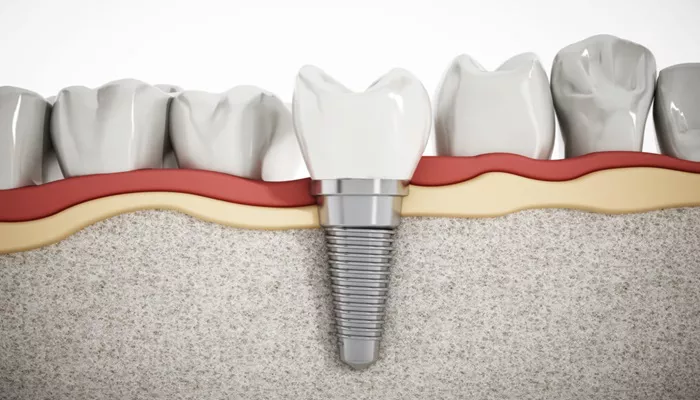Dental implants have become a popular solution for individuals seeking to replace missing teeth. They provide a durable, natural-looking alternative that can significantly enhance both functionality and aesthetics. However, to ensure the longevity and success of dental implants, proper care and maintenance are essential. This article will explore the general care required for dental implants, covering everything from immediate post-operative care to long-term maintenance strategies.
What Is Dental Implants?
Dental implants consist of three main components:
Implant Fixture: A titanium post surgically placed into the jawbone, serving as the root of the artificial tooth.
Abutment: A connector piece that attaches to the implant fixture and supports the crown.
Crown: The visible part of the implant that resembles a natural tooth.
The success of dental implants relies heavily on osseointegration, where the bone integrates with the implant fixture, providing stability. Proper care is crucial to prevent complications such as infection or implant failure.
SEE ALSO: How Is A Dental Implant Placed: A Step-by-Step Guide
Immediate Care After Surgery
After receiving dental implants, patients should follow specific guidelines to promote healing and ensure successful integration:
Manage Discomfort: It is common to experience some pain and swelling post-surgery. Dentists may prescribe pain medication or recommend over-the-counter options to alleviate discomfort.
Oral Hygiene Practices: Good oral hygiene is vital. Patients should follow their dentist’s instructions regarding gentle brushing and rinsing. Avoid disturbing the surgical site during the initial healing phase.
Dietary Restrictions: Stick to a soft-food diet for the first few days. Hard, crunchy, or sticky foods can disrupt the healing process and should be avoided.
Avoid Smoking: Smoking can significantly impair healing and increase the risk of complications. Patients are advised to refrain from smoking during recovery.
Long-Term Dental Implant Care
Once healing is complete, maintaining dental implants involves a consistent oral care routine similar to that for natural teeth:
Daily Oral Hygiene:
Brush at least twice a day using a soft-bristle toothbrush and non-abrasive toothpaste.
Floss daily around the implant using unwaxed tape or specially designed implant floss.
Consider using an oral irrigator to help remove debris from hard-to-reach areas.
Regular Dental Check-Ups:
Schedule routine check-ups every six months or as advised by your dentist.
Professional cleanings are crucial for preventing plaque and tartar buildup around implants.
Diet and Lifestyle Choices:
Maintain a balanced diet rich in vitamins and minerals to support overall oral health.
Stay hydrated; adequate water intake helps keep your mouth moist and aids in natural cleaning.
Minimize sugary snacks to reduce plaque formation.
Avoid tobacco products, as they can jeopardize implant health.
Use of Mouthwash:
Rinse with an antiseptic mouthwash formulated for dental implants to help kill bacteria and freshen breath.
Night Guards for Teeth Grinding:
If you grind your teeth at night, discuss with your dentist about using a mouthguard to protect your implants from excessive force.
Common Issues And Troubleshooting
Even with proper care, patients may encounter issues with their dental implants. Recognizing early signs of potential problems can help prevent complications:
Signs of Infection:
Persistent pain or discomfort around the implant site may indicate infection.
Swelling or redness in the gums surrounding the implant should be addressed immediately.
Loose or Shifting Implant:
If an implant feels loose or shifts, contact your dentist promptly for evaluation.
Gum Irritation:
Irritation around the gums may signal a need for professional cleaning or adjustment of the implant.
Peri-implantitis:
This condition involves inflammation around the implant caused by bacterial infection and requires immediate attention to prevent implant loss.
Importance of Professional Maintenance
Professional maintenance is critical for ensuring the longevity of dental implants:
Regular Cleanings: Dental professionals use specialized tools to clean areas around implants that may be difficult to reach with regular brushing.
Monitoring Bone Levels: X-rays are often used during check-ups to monitor bone stability around implants over time.
Early Problem Detection: Regular visits allow dentists to identify potential issues early when treatment is more straightforward and less invasive.
Conclusion
Caring for dental implants requires a proactive approach that encompasses immediate post-operative care, diligent daily hygiene practices, regular professional maintenance, and lifestyle choices that support oral health. By adhering to these guidelines, patients can enjoy their dental implants for many years, enhancing their quality of life through improved function and aesthetics.
Investing time in proper care not only protects your investment in dental implants but also contributes significantly to overall oral health. Remember that regular communication with your dentist is keys about your implants.
Related topics:

